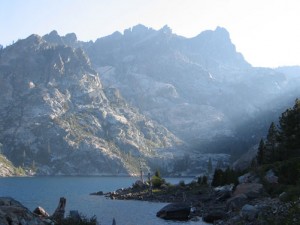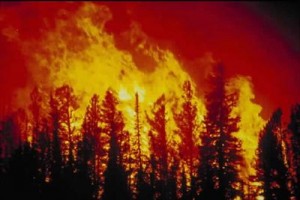California is parched and yellow in late August, before the rains begin – but away from the coasts, the dryness becomes dire. Inevitable wildfires are seasonal guests in the famed “Gold Country.”
I am driving through the manzanita, scrub pine, live oak, and dry brush of the fire-scarred Sierra Nevada foothills en route to a stepson’s wedding.
A journey that only a dozen years ago would have been accompanied by a lapful of maps is instead guided by a handful of google printouts and “Eunice,” the Australian-voiced GPS in my daughter’s ancient Toyota. Eunice won out against google with her reassuring voice, and by promising the shortest route – though, as it turned out, not the quickest. Eventually, Eunice steered us through Woodland, Marysville, and Downieville, winding along Highway 49 over Bullard’s Bar, the dam where the current wildfire blazes after devouring 1,300 acres. The smell of smoke (“like salami,” said my daughter) penetrates the car and, in places, fogs the landscape.
The moon is huge, heavy, and low on the horizon, a golden half-melon. The chill takes even the August air by the time you reach 5,000 feet. For my daughter, this is home. Now, a city-dweller, she is nostalgic, but can’t envision the place as a campground. She’d rather, if she were inclined that way, go to Oregon’s redwoods, rather than these “gross pines and scrub.”
We encounter no one on our travels, speeding through the darkness towards Sardine Lake. “We are in the center of nowhere,” she says, as we drive deeper into the night, past the deserted Coyote Café, North Yuba Trail, and signs that advertise sales for “Aged Steer manure.” We see a jackrabbit and a gray fox ambling across the street at midnight.
I do not like the country. I lived here for a decade — and fled for my home three times in the face of approaching walls of flame. The granite walls along the highways are striking, but more than offset tonight by the bugs hitting the windshield, and the possibility (not having checked beforehand) that these orange warning signs we are passing will yield to closed roads and detours unforeseen by Eunice. This very California landscape overwhelmed Czesław Miłosz, also, and he chastised its spokesman, Robinson Jeffers, who viewed humanity as a blight on a more-perfect natural world. Miłosz wrote:
Better to carve suns and moons on the joints of crosses
as was done in my district. To birches and firs
give feminine names. To implore protection
against the mute and treacherous might
than to proclaim, as you did, an inhuman thing.
The moon moves as we round the winding curves — it goes under and over mountains again and again, digging out the hills with its golden shovel.
What I miss most about living in these hills is the quality of silence, that enters you, that deepens into still pools within you. The solitude that troubles my daughter (reminding her of the opening scene of a horror flick, where someone horrible jumps out of the bushes), refreshes me.
All this was meant to be a lead-in to another California poet, Moore Moran, and his poem on the Gold Country, “Outside Truckee.” But driving through the night, thinking of Miłosz’s alienation from the California landscape that has entered me, that entered him, too, I find I am drawn instead to Moran’s poem on the facing page, “Star Dust,” which concludes:
Yearn is another term for breathing.
Hostage, we live on cruising wheels,
eye ever quick, need ever seething,
rejections linger … unrung bells.We trust our immortality
To sex, its produce and its scars,
and so persists the roundelay,
This dance of dust among the stars.




